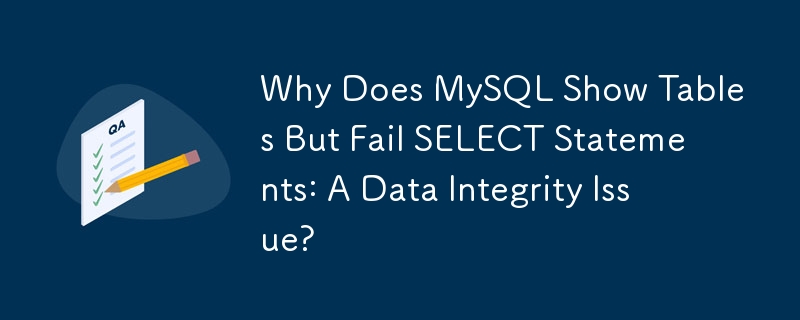Home >Database >Mysql Tutorial >Why Does MySQL Show Tables But Fail SELECT Statements: A Data Integrity Issue?
Why Does MySQL Show Tables But Fail SELECT Statements: A Data Integrity Issue?
- Barbara StreisandOriginal
- 2024-12-03 19:22:11831browse

MySQL Confusion: Tables Exist in SHOW TABLES but Not In SELECT Statements
In MySQL, encountering the error message "Table doesn't exist" when attempting to SELECT data from a table can be puzzling, especially if the table is listed in the SHOW TABLES statement. This article explores a potential cause and provides a solution based on a recent user experience.
Understanding the Cause
When faced with this issue, it is crucial to consider that SHOW TABLES checks for file existence, but it does not validate file integrity. Therefore, it is possible to have table files that exist in the data directory but are corrupt, leading to the "table does not exist" error.
The Corruption Culprit
In one instance, a user experienced this issue after copying a database directory using the cp command. This action failed to include essential InnoDB table-related files (e.g., ibdata1, ib_logfile0, ib_logfile1) in the new data directory, causing the corruption.
The Solution
To resolve the issue, it is imperative to copy the ib* files from the original data directory to the new data directory. This can be done manually or through a script that ensures all necessary files are present in the correct location.
Conclusion
While SHOW TABLES may indicate that tables exist, it is not enough to guarantee their accessibility. Ensure the integrity of table files by transferring ib* files along with the database directory. This approach will resolve the "table does not exist" error and restore the ability to SELECT data from the tables.
The above is the detailed content of Why Does MySQL Show Tables But Fail SELECT Statements: A Data Integrity Issue?. For more information, please follow other related articles on the PHP Chinese website!

